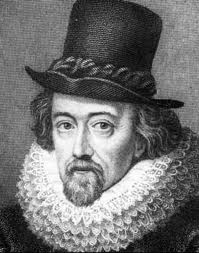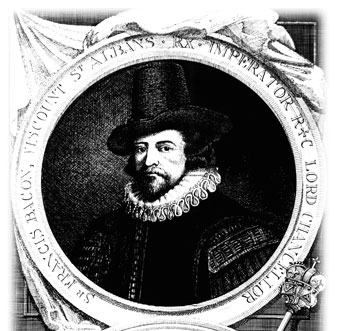 “Bacon outlines his scheme for a new division of human knowledge into three primary categories: History, Poesy, and Philosophy (which he associates respectively with the three fundamental “faculties” of mind – memory, imagination, and reason).”
“Bacon outlines his scheme for a new division of human knowledge into three primary categories: History, Poesy, and Philosophy (which he associates respectively with the three fundamental “faculties” of mind – memory, imagination, and reason).”
Sir Francis Bacon (later Lord Verulam and the Viscount St. Albans) was an English lawyer, statesman, essayist, historian, intellectual reformer, philosopher, and champion of modern science. Early in his career he claimed “all knowledge as his province” and afterwards dedicated himself to a wholesale revaluation and re-structuring of traditional learning. To take the place of the established tradition (a miscellany of Scholasticism, humanism, and natural magic), he proposed an entirely new system based on empirical and inductive principles and the active development of new arts and inventions, a system whose ultimate goal would be the production of practical knowledge for “the use and benefit of men” and the relief of the human condition.
Scientific and Philosophical Works
It is never easy to summarize the thought of a prolific and wide-ranging philosopher. Yet Bacon somewhat simplifies the task by his own helpful habits of systematic classification and catchy mnemonic labeling. (Thus, for example, there are three “distempers” – or diseases – of learning,” eleven errors or “peccant humours,” four “Idols,” three primary mental faculties and categories of knowledge, etc.) In effect, by following Bacon’s own methods it is possible to produce a convenient outline or overview of his main scientific and philosophical ideas.
The “Distempers” of Learning
“There be therefore chiefly three vanities in studies, whereby learning hath been most traduced.” Thus Bacon, in the first book of the Advancement. He goes on to refer to these vanities as the three “distempers” of learning and identifies them (in his characteristically memorable fashion) as “fantastical learning,” “contentious learning,” and “delicate learning” (alternatively identified as “vain imaginations,” “vain altercations,” and “vain affectations”).
By fantastical learning (“vain imaginations”) Bacon had in mind what we would today call pseudo-science: i.e., a collection of ideas that lack any real or substantial foundation, that are professed mainly by occultists and charlatans, that are carefully shielded from outside criticism, and that are offered largely to an audience of credulous true believers. In Bacon’s day such “imaginative science” was familiar in the form of astrology, natural magic, and alchemy.
By contentious learning (“vain altercations”) Bacon was referring mainly to Aristotelian philosophy and theology and especially to the Scholastic tradition of logical hair-splitting and metaphysical quibbling. But the phrase applies to any intellectual endeavor in which the principal aim is not new knowledge or deeper understanding but endless debate cherished for its own sake.
Delicate learning (“vain affectations”) was Bacon’s label for the new humanism insofar as (in his view) it seemed concerned not with the actual recovery of ancient texts or the retrieval of past knowledge but merely with the revival of Ciceronian rhetorical embellishments and the reproduction of classical prose style. Such preoccupation with “words more than matter,” with “choiceness of phrase” and the “sweet falling of clauses” – in short, with style over substance – seemed to Bacon (a careful stylist in his own right) the most seductive and decadent literary vice of his age.
Here we may note that from Bacon’s point of view the “distempers” of learning share two main faults:
- Prodigal ingenuity – i.e., each distemper represents a lavish and regrettable waste of talent, as inventive minds that might be employed in more productive pursuits exhaust their energy on trivial or puerile enterprises instead.
- Sterile results – i.e., instead of contributing to the discovery of new knowledge (and thus to a practical “advancement of learning” and eventually to a better life for all), the distempers of learning are essentially exercises in personal vainglory that aim at little more than idle theorizing or the preservation of older forms of knowledge.
In short, in Bacon’s view the distempers impede genuine intellectual progress by beguiling talented thinkers into fruitless, illusory, or purely self-serving ventures. What is needed – and this is a theme reiterated in all his later writings on learning and human progress – is a program to re-channel that same creative energy into socially useful new discoveries.
The Reclassification of Knowledge
 In Book II of De Dignitate (his expanded version of the Advancement) Bacon outlines his scheme for a new division of human knowledge into three primary categories: History, Poesy, and Philosophy (which he associates respectively with the three fundamental “faculties” of mind – memory, imagination, and reason). Although the exact motive behind this reclassification remains unclear, one of its main consequences seems unmistakable: it effectively promotes philosophy – and especially Baconian science – above the other two branches of knowledge, in essence defining history as the mere accumulation of brute facts, while reducing art and imaginative literature to the even more marginal status of “feigned history.”
In Book II of De Dignitate (his expanded version of the Advancement) Bacon outlines his scheme for a new division of human knowledge into three primary categories: History, Poesy, and Philosophy (which he associates respectively with the three fundamental “faculties” of mind – memory, imagination, and reason). Although the exact motive behind this reclassification remains unclear, one of its main consequences seems unmistakable: it effectively promotes philosophy – and especially Baconian science – above the other two branches of knowledge, in essence defining history as the mere accumulation of brute facts, while reducing art and imaginative literature to the even more marginal status of “feigned history.”
Evidently Bacon believed that in order for a genuine advancement of learning to occur, the prestige of philosophy (and particularly natural philosophy) had to be elevated, while that of history and literature (in a word, humanism) needed to be reduced. Bacon’s scheme effectively accomplishes this by making history (the domain of fact, i.e., of everything that has happened) a virtual sub-species of philosophy (the domain of realistic possibility, i.e., of everything that can theoretically or actually occur). Meanwhile, poesy (the domain of everything that is imaginable or conceivable) is set off to the side as a mere illustrative vehicle. In essence, it becomes simply a means of recreating actual scenes or events from the past (as in history plays or heroic poetry) or of allegorizing or dramatizing new ideas or future possibilities (as in Bacon’s own interesting example of “parabolic poesy,” the New Atlantis.)
The Idols
In Book I of the New Organon (Aphorisms 39-68), Bacon introduces his famous doctrine of the “idols.” These are characteristic errors, natural tendencies, or defects that beset the mind and prevent it from achieving a full and accurate understanding of nature. Bacon points out that recognizing and counteracting the idols is as important to the study of nature as the recognition and refutation of bad arguments is to logic. Incidentally, he uses the word “idol” – from the Greek eidolon (“image” or “phantom”) – not in the sense of a false god or heathen deity but rather in the sense employed in Epicurean physics. Thus a Baconian idol is a potential deception or source of misunderstanding, especially one that clouds or confuses our knowledge of external reality.
Bacon identifies four different classes of idol. Each arises from a different source, and each presents its own special hazards and difficulties.
1. The Idols of the Tribe. These are the natural weaknesses and tendencies common to human nature. Because they are innate, they cannot be completely eliminated, but only recognized and compensated for. Some of Bacon’s examples are:
- Our senses – which are inherently dull and easily deceivable. (Which is why Bacon prescribes instruments and strict investigative methods to correct them.)
- Our tendency to discern (or even impose) more order in phenomena than is actually there. As Bacon points out, we are apt to find similitude where there is actually singularity, regularity where there is actually randomness, etc.
- Our tendency towards “wishful thinking.” According to Bacon, we have a natural inclination to accept, believe, and even prove what we would prefer to be true.
- Our tendency to rush to conclusions and make premature judgments (instead of gradually and painstakingly accumulating evidence).
2. The Idols of the Cave. Unlike the idols of the tribe, which are common to all human beings, those of the cave vary from individual to individual. They arise, that is to say, not from nature but from culture and thus reflect the peculiar distortions, prejudices, and beliefs that we are all subject to owing to our different family backgrounds, childhood experiences, education, training, gender, religion, social class, etc. Examples include:
- Special allegiance to a particular discipline or theory.
- High esteem for a few select authorities.
- A “cookie-cutter” mentality – that is, a tendency to reduce or confine phenomena within the terms of our own narrow training or discipline.
3. The Idols of the Market Place. These are hindrances to clear thinking that arise, Bacon says, from the “intercourse and association of men with each other.” The main culprit here is language, though not just common speech, but also (and perhaps particularly) the special discourses, vocabularies, and jargons of various academic communities and disciplines. He points out that “the idols imposed by words on the understanding are of two kinds”: “they are either names of things that do not exist” (e.g., the crystalline spheres of Aristotelian cosmology) or faulty, vague, or misleading names for things that do exist (according to Bacon, abstract qualities and value terms – e.g., “moist,” “useful,” etc. – can be a particular source of confusion).
4. The Idols of the Theatre. Like the idols of the cave, those of the theatre are culturally acquired rather than innate. And although the metaphor of a theatre suggests an artificial imitation of truth, as in drama or fiction, Bacon makes it clear that these idols derive mainly from grand schemes or systems of philosophy – and especially from three particular types of philosophy:
- Sophistical Philosophy – that is, philosophical systems based only on a few casually observed instances (or on no experimental evidence at all) and thus constructed mainly out of abstract argument and speculation. Bacon cites Scholasticism as a conspicuous example.
- Empirical Philosophy – that is, a philosophical system ultimately based on a single key insight (or on a very narrow base of research), which is then erected into a model or paradigm to explain phenomena of all kinds. Bacon cites the example of William Gilbert, whose experiments with the lodestone persuaded him that magnetism operated as the hidden force behind virtually all earthly phenomena.
- Superstitious Philosophy – this is Bacon’s phrase for any system of thought that mixes theology and philosophy. He cites Pythagoras and Plato as guilty of this practice, but also points his finger at pious contemporary efforts, similar to those of Creationists today, to found systems of natural philosophy on Genesis or the book of Job.






























